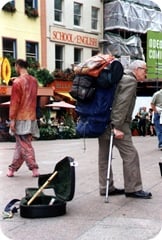Once again a post by Willy’s Cardoso has kept me up late feeling I just HAVE TO write and examine why it has struck a chord with me.
At first glance, you may be tempted to make some false assumptions regarding my connection to this post, named “London Writing” . Since you know I’m not in London let me make it clear that I don’t play the guitar (love to listen to music but just played the piano badly for a few years). In addition, I haven’t met any of the people Willy mentioned (though I DID have an interesting conversation about David Crystal in the remote island of Skellig Michael in Ireland and then corresponded with Professor Crystal about it!).
Willy Cardoso writes:
“…encounters I would have with amazing and inspiring ELT professionals, with whom I was able to socialize and learn thanks to this blog and to Twitter. I know I wouldn’t have done so much in this first year here if it wasn’t for the people I met through blogging…”
ABSOLUTELY TRUE! Ties in with my previous post about the long reaching power of my PLN.
Another quote:
“It was a year of writing…The more I blog, the more I learn. The more I blog, the more I position myself in the profession and in the world, and then I change, I find new perspectives, watch my language and bite my tongue. All in all, I’ve found a channel of self-expression so important to any professional life, but extremely important to the education profession.”
It’s only been nine months since I began my blog but it has had a profound impact, as Willy put so well into words for me. I feel the same way. And I never would have guessed it would be so because how many teachers-of-English-as-a-foreign-language to deaf students are there out there? Yet, I feel I am “growing” in the same way that Willy describes!
One more quote:
“…I don’t know who is actually on the other side…Hence, I rarely have a reader in mind,” – yeah, me neither. I know a few and am grateful that they read. Basically I’m writing because I need to write yet there is great power in every comment left on my blog. Writing that is noticed seems to lead to more writing.
So, I’ll end this post by wishing Willy Cardoso the best of luck with his M.A. I finished mine 15 years ago and can say that I’m glad I have it.
P.S Here’s one my favorite photos from London (notice the “School of English” sign in the background) by Gil Epshtein











